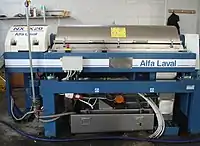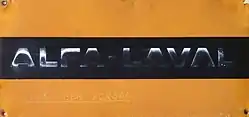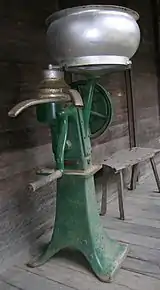Alfa Laval
Alfa Laval AB is a Swedish company, founded in 1883 by Gustaf de Laval and Oscar Lamm.[1] The company, which started in the separation of solutions, now deals in the production of specialized products and solutions for heavy industry. The products are used to heat, cool, separate and transport such products as oil, water, chemicals, beverages, foodstuffs, starch and pharmaceuticals.
 | |
| Type | Publicly traded Aktiebolag |
|---|---|
| Nasdaq Stockholm: ALFA | |
| Industry | Manufacturing, engineering and service |
| Founded | 1883[1] |
| Headquarters | Lund, Sweden |
Key people | Tom Erixon (President and CEO), Anders Narvinger (Chairman) |
| Revenue | |
| Total assets | |
| Total equity | |
Number of employees | |
| Website | www.alfalaval.com |


Alfa Laval is headquartered in Lund, Sweden and has subsidiary companies in over 35 countries around the world, including South Africa, Denmark, Italy, India, Japan, China, Netherlands, and the United States. In 2016, Alfa Laval had a global workforce of 17,309 employees and revenue of $4,715.96 million.[3] Alfa Laval is a heavy industry company that focuses on the large-scale operations, such as the Marine, Energy, and Food industries.

Alfa Laval in the Maritime Industry
Alfa Laval manufactures valves, pumps, heat exchangers, evaporators, distillers, oil separators, filters, and all other hardware vital to the operation of the a ship's engine room. As of 2011, Alfa Laval consolidated its Marine, Offshore, and Diesel divisions into one, Marine & Diesel, division in an effort to simplify logistics and administration of its marine wing.[4]
History
The company was founded in 1883 as AB Separator and in 1938 produced its first heat exchanger. The name Alfa-Laval was introduced in 1963, spelled with a hyphen until 1993. (The "Alfa" is derived from the alpha disc, or Alfa-disc, an invention by Clemens von Bechtolsheim that was acquired by Separator in 1889.[5]) In 1991 Alfa Laval was acquired by Tetra Pak and between 1993 and 2000 Alfa Laval was a part of the Tetra Laval Group. In 1993, Alfa Laval Agri, a company producing dairy farming equipment, was split from Alfa Laval. When Alfa Laval was sold, Alfa Laval Agri remained a part of the Tetra Laval Group and was renamed DeLaval, after the company's founder.
Alfa Laval now divides its operations between equipment (capital sales) and process technology (contracts with longer duration).
Recently, Alfa Laval has been working towards the consolidation of its manufacturing of boilers. By 2014, Alfa Laval should have all its manufacturing of boilers located in Qingdao, China. The boiler manufacturing plant in Hai Phong, Vietnam have been shut down in 2013 due to production consolidation.[6]
As of 2012, Alfa Laval has a total of 32 manufacturing facilities: 15 of which are located in Europe, nine in Asia, six in the United States, and two in Latin America.[6]
In 1983, Alfa Laval entered the biotechnology industry by offering separators that can isolate genetic samples.[7]
In midsummer 2008 there was a theft at the facility at Lund where 80 metric ton of titanium were stolen in two trailers that were driven to Poland.
International operations

Manufacturing at Alfa Laval is carried out in several countries including Sweden, India, China, the UK, and USA.
Canada
In Canada, Alfa Laval has had a presence for over 100 years, previously as D-Laval, which would provide such services to farmers as assisting them in the storage of their milk and providing cream separators. Alfa Laval is headquartered in Toronto and in 2009 opened a service centre in Edmonton, Alberta. In late 2010, staff in the Canadian operations numbered 74.
United States
Alfa Laval has been present in the United States of America for more than 130 years—marketing and supplying a broad range of heat exchangers, separators, decanters, pumps, tank cleaning devices, valves and fittings to customers in a wide range of market segments. The company is known for such product ranges as Tri-Clover, Contherm, Sharples, Merco, Kathabar, ACE, Standard Refrigeration, Niagara Blower, Vortex, Ashbrook Simon-Hartley and Gamajet. There are around 700 employees in the US—with 15 locations including Richmond, VA; Warminster, PA; Kenosha, WI; Wood Dale, IL; Carter Lake, IA; Sarasota, FL; and Newburyport, MA; — as well as an International distribution center in Indianapolis, IN. There are 11 service and repair centers in locations such as Fresno, CA; Houston, TX; Chesapeake, VA; Tonawanda, NY and Carter Lake, IA. Heat exchangers, fluid handling and separation equipment are manufactured in the US.[8]
United Kingdom
Alfa Laval's head office is located in Camberley, Surrey. Their pumps and manufacturing division has offices in Eastbourne, with further sales offices in Birmingham, Newcastle-under-Lyme and Aberdeen.[9]
Alfa Laval’s major competitors
There are two major competitors to Alfa Laval that offer equipment and solutions for heavy industry: Doosan Heavy Industries & Construction based in South Korea, and Harbin Power Equipment based in China.
As of 2012, Doosan leads the industry with 8,654.85 million dollars in global sales. Although Doosan only has 6,871 employees, (compared to Alfa Laval's 16,419 employees), it has a strong international presence, especially in the rapidly developing Middle East.[10][11] Doosan competes with Alfa Laval in nearly every sector—coal boilers, gas turbines, steam generators, heat exchangers, etc. South Korea is the shipbuilding capital of the world and its government protects Doosan with stimulus funds and legislation.[12]
Alfa Laval is the second leader with 4,520.96 million dollars in global sales.[10] Western Europe and the United States continue to be Alfa Laval main customers. The two Asian companies, Doosan and Harbin, present a huge challenge to Alfa Laval and its growth in the Asian market.[13]
Harbin is the largest of the three competitors with 20,106 employees, however, trails behind with 4,121.19 million dollars in global sales.[14] The Chinese economy is slowing, and attempts to expand sales to Africa and South America has not been as successful as the General Manager of Harbin, Wu Weizhang has hoped.[15] In 2011, Harbin went private with the help of the China Development Bank Corporation, allowing the senior leadership team to focus on global competitiveness rather than the liquid asset of corporate shares. Harbin competes with Alfa Laval in the production of industrial rotary motors and other equipment required for the energy industry.[16]
Safety issues
In April 2016, the Occupational Safety and Health Administration in the United States fined the company $172,700 for violations of safety rules.[17]
Business management
CEOs
- 1883–1886 – Oscar Lamm
- 1887–1915 – John Bernström
- 1915–1922 – Erik Bernström
- 1922–1946 – Axel Wästfelt
- 1946–1960 – Harry G. Faulkner
- 1960–1980 – Hans Stahle
- 1980–1989 – Harry Faulkner
- 1989–1991 – Lars Kylberg
- 1991–1992 – Lars Halldén
- 1992–1994 – Gunnar Brock
- 1995–1998 – Leif Rogersson
- 1997–2004 – Sigge Haraldsson
- 2004–2016 – Lars Renström
- 2016–Current – Tom Erixon
Chairman of the Board
- 1932–1962 – Raoul Nordling
- 1980–1989 – Hans Stahle
- 1991–1998 – Bertil Hagman
- 2000–2003 – Thomas Oldér
- 2003–Current – Anders Narvinger
References
- Wohlert, Claus (1993). "Bnet article on Alfa Laval AB". International Directory of Company Histories.
- "Annual Report 2019" (PDF). Alfa Laval AB. pp. 76, 82, 86, 87. Retrieved October 24, 2020.
- Morningstar, Alfa Laval profile(2016). Retrieved September 1, 2016, from Avention/Onesource Business Intelligence Database.
- "Alfa Laval unveils new three division structure". Pump Industry Analyst. 2011 (11): 13. November 2011. doi:10.1016/S1359-6128(11)70469-4.
- "History of Alfa Laval". www.alfalaval.com. Retrieved 2016-02-09.
- IStockAnalyst. (2013, February 07). Alfa laval consolidates manufacturing of boilers in asia. Retrieved from "Archived copy". Archived from the original on 2014-07-15. Retrieved 2013-05-08.CS1 maint: archived copy as title (link)
- "Alfa-Laval: Updating Its Knowhow for the Biotechnology Era". Bloomberg Businessweek. No. 2808. 19 September 1983. p. 80. ProQuest 236649473.
- "USA webpage". Alfalaval.us. Retrieved 2012-10-15.
- "Contact us, Alfa Laval". local.alfalaval.com. Archived from the original on 2015-10-25. Retrieved 2015-10-10.
- Dow Jones, Alfa Laval AB company profile(2013). Retrieved May 6, 2013, from Factiva database
- Dow Jones, Doosan Heavy Industries & Construction company profile(2013). Retrieved May 6, 2013, from Factiva database
- (April 16, 2013 Tuesday ). “Doosan Heavy Industries & Construction - Q3 2013”. Business Monitor International. South Korea Infrastructure Report, Retrieved from LexisNexis Database.
- Alfa Laval. (2012). Fourth Quarter and Full Year 2012 Report and Summary. Retrieved from http://feed.ne.cision.com/wpyfs/00/00/00/00/00/1D/72/0D/wkr0006.pdf
- Dow Jones, Harbin Electric company profile(2013). Retrieved May 6, 2013, from Factiva database
- Yu, Sophie. (August 21, 2012 Tuesday). Harbin Electric orders strong despite bleakness; Higher gross profit margin and trading gains help first-half net earnings climb 21.4 percent. South China Morning Post, Retrieved from LexisNexis database
- Bulkeley, Andrew (June 20, 2011 Monday). Harbin Electric unveils CEO-led buyout. Daily Deal/The Deal, Retrieved from LexisNexis database
- "Struck-by, amputation hazards to Houston workers lead OSHA to levy $172K in fines against Alfa Laval, global manufacturer". OSHA. April 12, 2016. Retrieved April 18, 2016.